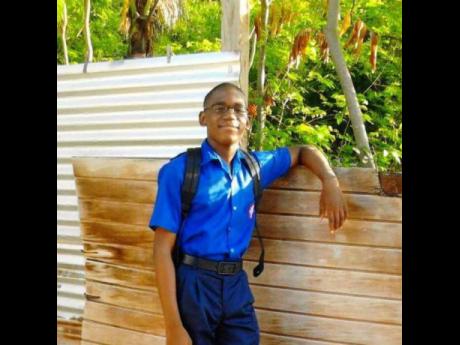‘Justice system let us down’
Family of slain teen gutted as judges slash 11 years off killer’s jail time
The family of the Jamaica College student who was murdered in 2016 said they are crushed by Tuesday’s Court of Appeal decision to shave 11 years off the 31-year prison term his killer was ordered to serve before being considered for parole. “We...
The family of the Jamaica College student who was murdered in 2016 said they are crushed by Tuesday’s Court of Appeal decision to shave 11 years off the 31-year prison term his killer was ordered to serve before being considered for parole.
“We are hurt, we are sad, we are upset. We are all the adjectives that you can think of. We believe in the justice system, but it let us down today,” Wesley Harris, grandfather of the victim, told The Gleaner.
Xavier Francis, an obviously distraught father of the victim, was also distressed.
“Twenty years, my son never get to spend 15 years on the earth and him get fi come back out inna 20. That can’t be fair at all. We weren’t even happy with 31 years. Now, this is even worse,” Francis said.
Fourteen-year-old Nicholas Francis died after he was stabbed in the chest on October 26, 2016, during an altercation on a bus with his killer, Quacie Hart, following an attempt to steal the teen’s watch.
Hart later pleaded guilty before the start of the trial in 2019 and was sentenced to life in prison.
The sentencing judge, Lorna Shelly-Williams, had ordered Hart to serve 31 years in prison before being considered eligible for parole.
The judge started at 40 years but had reduced the pre-parole sentence after crediting Hart with 10 per cent discount for his guilty plea and for the three years that he had spent in custody. Calculations for mitigating and aggravating factors were also factored.
Hart, however, appealed his sentence on the grounds that it was manifestly excessive.
The Court of Appeal, in allowing the appeal, found that the judge had erred in principle in arriving at the parole period.
The three-judge panel, which consisted of Justices Marva McDonald-Bishop, Vivene Harris, and Marcia Dunbar-Green, ruled on Tuesday that the pre-parole sentence was excessive, erroneous, and demonstratively disproportionate.
Reacting to the ruling, the father of the deceased student said he was not pleased with the decision, which he described as puzzling.
“I don’t understand what the judges are saying now that the first judge used a wrong formula,” he said.
The father recalled that the sentencing judge had assured him that she was using the correct approach to avoid any possible appeal challenge of the sentence.
“She tell me she couldn’t do certain things because she don’t want when it goes to appeal, them have anything wrong, so she going by the book.
“She basically soothe my nerve that the 31 years before parole would be fine based on the fact that she took off nine years as she started at 40,” he said. “Now to hear that them can take off 10 more years, this is very disturbing for the family, especially for the mother, who is away. ... This doesn’t make any sense.”
Harris meanwhile questioned the rationality of the judges’ acceptance that the sentence was excessive and harsh.
“When you look on what was excessive is the murder, not the sentence. He didn’t have to kill Nicholas that day; Nicholas didn’t even have a pencil in his hand to defend himself, but he was killed coming from school by a hoodlum.
“Can you give back Nicholas 11 years? If you can, I am in agreement with you taking off 11 years off his sentence,” he said.
According to Harris, family was devastated by Nicholas’ death, adding that the decision would compound their grief.
“We bled for three years and more and we did not expect to be bleeding again,” he said.
Harris also noted that the family was equally displeased that no one from the Office of the Director of Public Prosecutions notified them about the appeal.
Attorney-at-law Patrick Peterkin argued on Monday during the appeal hearing that the judge had not factored in his client’s age (21) at the time of the sentence or his remorse. He also said that the sentencing principles had not been properly applied.
The lawyer said that a reasonable starting point would have been 25 years instead of 40.
Acting Court of Appeal President, Justice McDonald-Bishop, in handing down the ruling, agreed with Peterkin’s submission that the pre-parole sentence was excessive and was more suitable for a convicted killer who took more than one life.
The judges further found that the sentencing judge had not used the correct methodology to determine the pre-parole sentence in accordance with the guidelines.
The judges pointed out that based on the circumstances of the case, the appropriate starting point would have been between the statutory minimum of 15 and 24 years considering that the murder was not committed to effect a robbery or in the furtherance of a robbery.
The panel noted that “even if the applicant had committed the murder in furtherance of a robbery, the starting point to 40 years would have been too high, having regard to the statutory minimum period of 20 years for a murder of that nature.
“There is no justification in law or reason for a starting point of over 40 years for a murder falling within Section 2 of the [Offences Against the Person Act] involving a knife and one fatal wound,” Justice McDonald-Bishop added.
Given that the statutory minimum for capital murder is 20 years, the appellate judge said the sentencing judge would have doubled the statutory range that should be imposed in a more serious murder.
She further noted that the law requires that when a person pleads guilty to murder, his life sentence should start at 30. The appeal judge emphasised that the pre-parole period should not exceed the life sentence stipulation.

